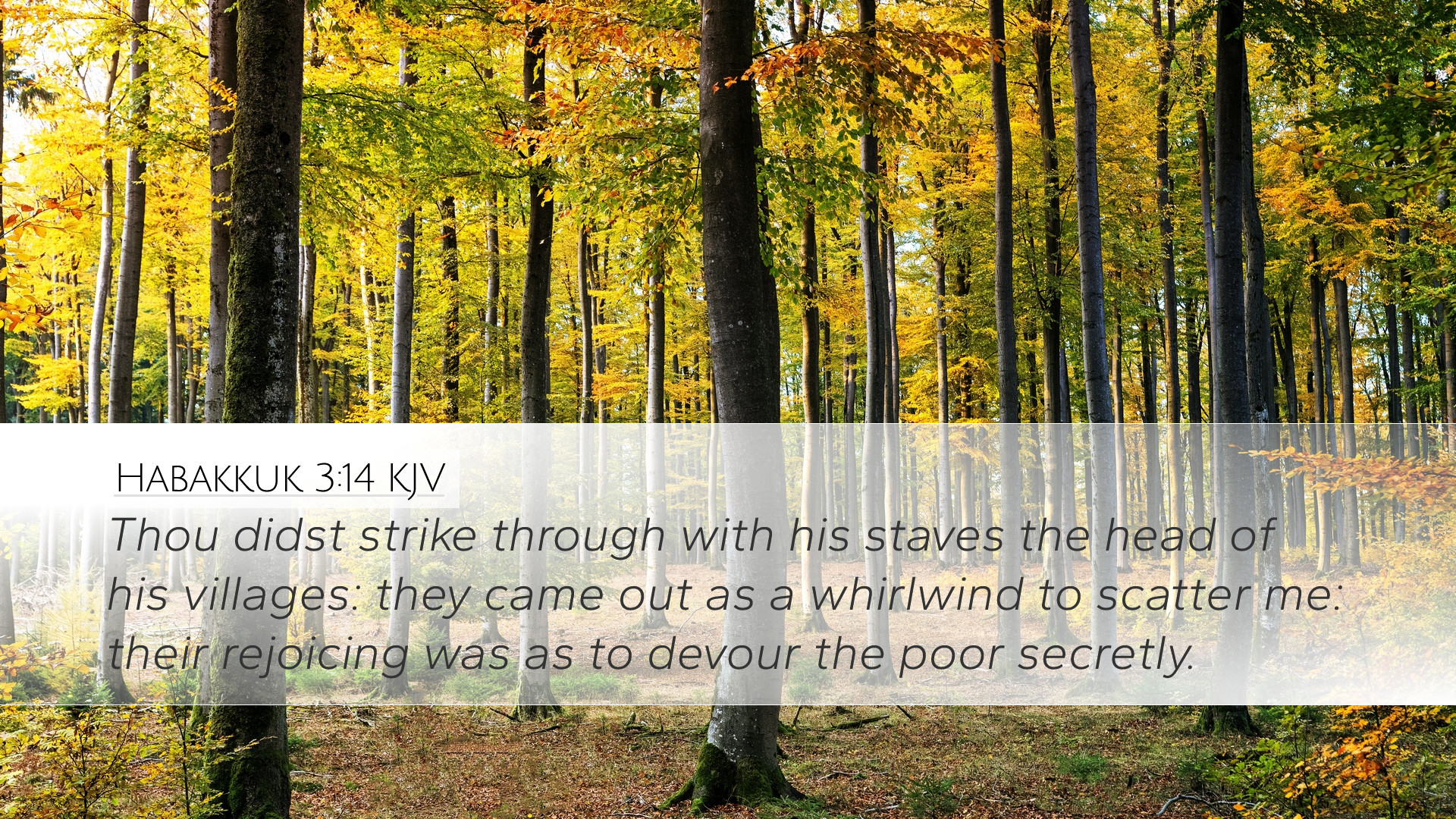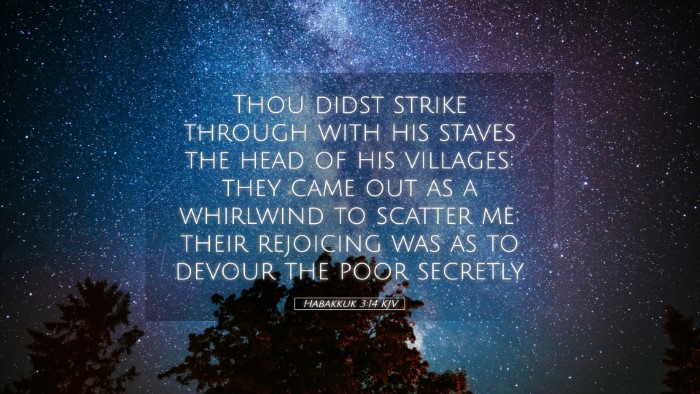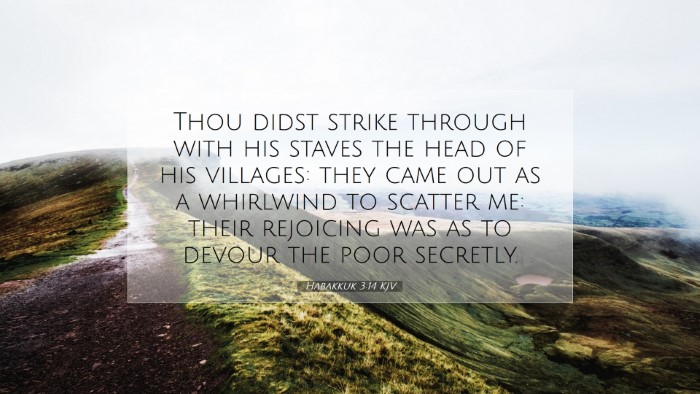Old Testament
Genesis Exodus Leviticus Numbers Deuteronomy Joshua Judges Ruth 1 Samuel 2 Samuel 1 Kings 2 Kings 1 Chronicles 2 Chronicles Ezra Nehemiah Esther Job Psalms Proverbs Ecclesiastes Song of Solomon Isaiah Jeremiah Lamentations Ezekiel Daniel Hosea Joel Amos Obadiah Jonah Micah Nahum Habakkuk Zephaniah Haggai Zechariah MalachiHabakkuk 3:14
Habakkuk 3:14 KJV
Thou didst strike through with his staves the head of his villages: they came out as a whirlwind to scatter me: their rejoicing was as to devour the poor secretly.
Habakkuk 3:14 Bible Commentary
Commentary on Habakkuk 3:14
Verse: "Thou didst strike through with his staves the head of his villages: they came out as a whirlwind to scatter me: their rejoicing was as to devour the poor secretly."
Introduction
The prophecy of Habakkuk offers profound insights into God's sovereignty and justice, even amidst oppression and turmoil. In chapter 3, Habakkuk's prayer reflects a deep understanding of God's past dealings with His people and nations. Verse 14 serves as a powerful reminder of God's judgment upon oppressive rulers and the ultimate triumph of divine justice.
Verse Breakdown
- Divine Judgment: Habakkuk describes how God strikes through the oppressors with their own devices, using the metaphor of staves. This indicates that God not only judges but also uses the very methods of enemies against them.
- Oppression: Referred to as "the head of his villages," the phrase symbolizes the authority and influence of oppressive rulers. These leaders, often portrayed as mightier than local powers, are ultimately diminished by God's hand.
- Imagery of Scattering: The mention of the whirlwind illustrates chaos and destruction — signifying how quickly and unexpectedly God's judgment can manifest against evil.
- Secret Malice: Words like "their rejoicing was as to devour the poor secretly" reveal the treachery inherent in human nature. It shows the cunning ways the oppressors exploit and celebrate their victories over the innocent.
Theological Insights
- The Sovereignty of God: The text emphasizes God's absolute authority and capability. He orchestrates events according to His divine will, reaffirming to believers that no one can ultimately stand against Him.
- Justice for the Oppressed: God's concern for the marginalized is evident. He does not overlook or allow the suffering of the poor and oppressed to persist without consequence for their oppressors.
- Hope in Judgment: For believers, the impending judgment of God is a source of hope. Habakkuk's assurance that God will intervene assures us that justice prevails, even if the present circumstances seem bleak.
Commentary Insights
Matthew Henry's Commentary
Matthew Henry notes that God strikes at the oppressor, showcasing His divine strength. He interprets the 'staves' mentioned as God's instruments of justice, which are used to humble the proud. This liberation from oppression is not merely for physical freedom but also for spiritual restoration.
Albert Barnes' Notes
Albert Barnes emphasizes that the phrase "head of his villages" refers to the leaders of nations or tribes who are instruments of oppression. He views God’s judgment as a means to subvert earthly powers, underscoring the concept that eventually all rulers will answer to the Supreme Judge.
Adam Clarke's Commentary
Adam Clarke elaborates that the language of "whirlwind" conveys God's fierce and swift judgment. He illustrates that even those who appear to have power over the righteous will find themselves in disarray when faced with divine intervention. Clarke also reflects on the metaphor of 'devouring the poor,' suggesting that such actions are ultimately futile against God's purposes.
Practical Application
- Pastoral Reflection: Pastors can draw from this text to encourage their congregation to remain steadfast in faith, even when faced with injustice. It serves as a reminder of God's sovereign protection over His people.
- Academic Study: Theological students should consider the historical context of oppression and divine judgment presented in Habakkuk's narrative, enabling them to understand how these themes translate to contemporary issues of justice and mercy.
- Personal Growth: Individuals reflecting on this passage may find comfort in knowing that God is aware of their struggles and will vindicate them in His perfect timing.
Conclusion
Habakkuk 3:14 serves as a poignant reminder of God's power to judge and deliver His people from oppression. Through the insights of esteemed biblical commentators, we gain a deeper understanding of God's character—addressing the complexities of justice, mercy, and divine retribution. This passage challenges believers to hold firmly to their faith, trusting in God's ultimate authority over both individuals and nations.


